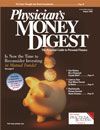Land on Your Feet When Forced to Retire
Newsweek
The numbers are in, and the numbers don'tlie. According to a recent report in, 40% of Americans are forced toretire early for reasons beyond their control,such as illness or job loss.
Newsweek
Kiplinger's
And while 4 of 10 Americans are retiring early, theage for claiming full Social Security benefits is rising,from age 651/2 to age 67 for people born in 1960 or later.The onus is on individuals to secure their future toensure that their golden years truly are golden. Recentarticles in both and offer the followinginsight into how to secure your future and makecertain that you come out on top in retirement:
•Calculate retirement. Do you know how muchretirement will cost? According to the Employee BenefitResearch Institute (EBRI), half of all workers aged 45and up haven't even attempted to calculate what theirmonetary retirement needs will be. And those who havedone the math are often shocked by the result. A goodplace to start is with one of the many calculators availableon the Web. Check out the easy-to-use calculator,Ballpark Estimate, at www.asec.org.
•Save, save, save. Americans are very good atspending, not so good at saving. According to a PutnamInvestments survey of 2000 retirees, 70% said theywished they had saved more during their working years;59% said they should have started saving earlier. One ofthe greatest fears of retirees or soon-to-be retirees is thatthey will outlive their resources. There's some validity tothat concern, because in addition to poor saving habits,people are living longer.
Newsweek
According to the article, 65-year-oldmen have a life expectancy of 81 years, while 65-yearoldwomen have a life expectancy of 84 years. But whatthat really means is that half of all men and women willexceed those life expectancies. Over those extendedlifetimes, savings can run down, especially if the savingsweren't significant to start. That's why it's criticalto take advantage of the retirement savings vehiclesthat are available.
Newsweek
•Pay off your home. It may come as a surprise,but today more people aged 65 to 75 years are carryingloans against their primary residence than 16years ago; 39% compared with 28%. The article points out that with home values rising, seniorstoday possess more home equity wealth than past generations.But they also need higher retirement incomesto meet their mortgage payments.
A paid-off home frees up more of your retirementincome, and gives you the added comfort of knowingthat in an emergency you have significant equity withwhich to tap into a home equity line of credit. In dire circumstances,you could always sell the home and eitherpurchase something smaller or rent.
Newsweek
•Manage your children's expenses. Financial plannerspoint out that overspenders often have trouble retiring.One area of overspending relates to your children,some of whom may be adults themselves. According tothe article, parents often support their childrenand drain their savings in the process. Supportcomes in the form of picking up restaurant checks orproviding financial backing for a lousy business venture.The bottom line, the article notes, is that if your retirementassets seem thin, a good place to start cutting backis by taking your children off the handout list.
•Work longer. In the end, you may find that, likemany prospective retirees, working longer is a viableoption. After all, the longer you work the fewer assetsyou'll need when it comes time to retire. And youwon't be alone.
Newsweek
According to the article, 33% of menaged 65 to 69 years work, and 12% aged 70 years andolder still work. For women 23% aged 65 to 69 yearswork, while 6% aged 70 years and older are stillactively employed. Regardless, preparation is the keyto a happy and successful retirement. Understandwhat your needs will be, and then establish a plan tomeet those goals.
